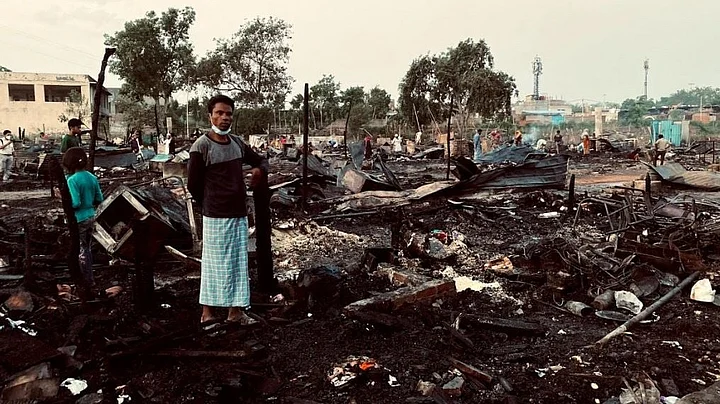Amidst the ongoing assembly elections in Jharkhand, Prime Minister Narendra Modi is reported to have accused the government led by the Jharkhand Mukti Morcha (JMM) of promoting the ‘infiltration’ of Rohingya refugees. Even though many BJP workers have been running hate campaigns for a long time against the Rohingyas, this is the first time the Prime Minister himself has used the issue in an election campaign to garner votes. Home Minster Amit Shah and BJP President JP Nadda have done the same.
India hosts many refugee communities who have arrived not only from our neighbourhood but also from other parts of Asia and far-off countries in Africa. At present, India hosts more than 92,000 Sri Lankan and 73,000 Tibetan refugees. There are more than 30,000 from Myanmar and 12,000 Afghan refugees in the country. According to the United Nations High Commissioner for Refugees (UNHCR), about 22,000 Rohingya refugees are registered with them, while the Indian Ministry of Home Affairs (MHA) has claimed there are more than 40,000 of them in the country.
Whatever the number, even 40,000 Rohingyas, as claimed by the MHA, is much less than some of the other refugee communities in the country. The number is a mere fraction of not only India’s population but also of Jharkhand's, which is estimated to be around 40.6 million in 2023. Moreover, in none of the registries that maintain data on the presence of Rohingya in India, is Jharkhand mentioned as a major location.
In the last few years, minor BJP functionaries and party workers have indulged in attacks and hate campaigns targeting the Rohingya refugees in India. Why is Prime Minister Modi singling out one just refugee community, that too in a manner bordering on xenophobia?
This kind of exclusion and hate is not the only way the Rohingya refugees are being treated differently from other refugee communities. They also face mass detention and threats of being deported back to Myanmar. According to several informal sources, more than 1000 Rohingyas including about 200 children are in detention across different states of India.
Most of them were charged with ‘illegal entry’ under the Foreigners Act of 1946 and the Passport Act of 1967. A majority have served the sentences they got from the local courts, and yet, they continue to be held indefinitely. Jammu, West Bengal, and Assam hold the maximum number of these refugees in indefinite detention.
Though the continued detention of refugees, even after serving their sentences, is ostensibly to deport them back to Myanmar, not more than 40 Rohingyas have been sent back since 2017, while the number of detainees exceeds 1000. Some of them have been in detention for more than 12 years.
While the non-refoulement of refugees back to their country where they face persecution is a part of international law, India has been bent upon sending these Rohingyas back to Myanmar where they indeed face persecution and death.
A more pertinent question is — why is India unable to deport the Rohingya refugees back to Myanmar? It is simply because Myanmar refuses to accept the Rohingya as its citizens. In such a situation, what purpose is served by keeping more than 1000 Rohingyas in detention?
Rohingya refugees have been in India since the early 2000s. Their status determination, as persons requiring international protection, is done by the UNHCR as per the mandate under the UN Refugee Convention, 1951. The refugees are mostly concentrated in Hyderabad, Delhi, Jammu, Rajasthan and Haryana. Most of them live in shanties and eke out a living by collecting urban recyclable waste and engaging in daily wage labour.
They have very little access to public health care and education facilities despite a 2018 Supreme Court interim order in Jaffar Ullah vs the Union of India in which the government gave assurances that the refugees would get the same services as Indian citizens.
India being an important country in the Asia Pacific region, its treatment of the Rohingya refugees has been an issue of concern for the international community.
It has remained aloof to their arrival in the country during the period between 2012 and 2015 but its treatment of the Rohingyas began to change in 2017 when the then Minister of State for Home Affairs, Kiren Rijiju, said the government was planning to deport Rohingyas from India because they are “illegal immigrants”. Since then, India has incarcerated more than a thousand Rohingyas and deported about not more than 40.
India’s singling out of the Rohingya refugees (on the basis of harsh treatment) was noted by the UN Committee on the Elimination of Racial Discrimination (CERD) in 2018 when it said that it was “concerned that the manifestations of racial discrimination against the Rohingya in India and [that] their return to Myanmar will infringe their rights protected under the International Convention on the Elimination of All Forms of Racial Discrimination."
In July this year, the committee again called on India “to end the arbitrary detention of the Rohingyas who fled Myanmar to India and refrain from forcible deportation and returns to Myanmar, where they would risk being subjected to serious human rights violations and abuses.”
It was also “deeply concerned about reports regarding the spread of racist hate speech and the dissemination of negative stereotypes against Rohingya” and the “racist hate speech by politicians and public figures, and the lack of information on investigations, prosecutions and convictions of public figures and politicians for hate speech.”
None of this bodes well for India in its quest to become a world leader. No country will accept the leadership of another country that engages in fomenting hate against a community like the Rohingyas whose situation is a major international concern.
(Ravi Hemadri is an activist and Director of the Delhi-based Development and Justice Initiative. Views are personal.)
(At The Quint, we question everything. Play an active role in shaping our journalism by becoming a member today.)
